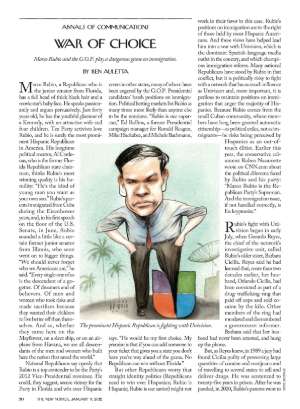ANNALS OF COMMUNICATIONS
WAR OF CHOICE
Marco Rubio and the G.O.P. play a dangerous game on immigration.
by Ken AulettaJANUARY 9, 2012

ABSTRACT: ANNALS OF COMMUNICATIONS about Republican senator Marco Rubio and immigration. Just forty years old, Marco Rubio, a Republican who is the junior senator from Florida, has the youthful glamour of a Kennedy, with an attractive wife and four children. Tea Party activists love him, and he is surely the most prominent Hispanic Republican in America. National Republicans say openly that Rubio is a top contender to be the Party’s 2012 Vice-Presidential nominee. He could, they suggest, secure victory for the Party in Florida and win over Hispanic voters in other states, many of whom have been angered by the G.O.P. Presidential candidates’ harsh positions on immigration. But Rubio’s positions on immigration are to the right of those held by most Hispanic Americans. And these views have helped lead him into a war with Univision, which is the dominant Spanish-language media outlet in the country, and which champions immigration reform. Rubio’s fight with Univision began in early July, when Geraldo Reyes, the chief of the network’s investigative unit, called Rubio’s older sister, Barbara Cicilia, and asked about her husband, Orlando, who, two decades earlier, had been convicted as part of a drug-trafficking ring that paid off cops and sold cocaine by the kilo. Soon after, a conference call was arranged with Rubio’s communications director, Alex Burgos, and Rubio’s senior political adviser, Todd Harris. In addition to Lee, five people from Univision were on the call: Reyes; the news vice-president, Daniel Coronell; the managing editor, Maria Martinez-Henao; and two senior Univision attorneys. Rubio’s staff wanted to kill the story. Univision wanted Rubio to answer questions on camera. On July 11th, four days after the conference call, Univision led off the evening news with the story. Mentions Isaac Lee and Jorge Ramos. On October 2nd, the Miami Herald and its Spanish-language sister paper, El Nuevo Herald, published a front-page account of the clash between Univision and Rubio, which alleged a shakedown on the part of Univision. Most of the major Republican Presidential candidates quickly announced that they would boycott any debate hosted by Univision, unless the network made amends. Steve Schmidt, a senior adviser to McCain’s 2008 campaign, calls the boycott of Univision “a profoundly short-sighted decision.” There are eleven million people living in the U.S. who immigrated illegally, and all the Republican candidates oppose virtually any path to citizenship. All, except for Jon Huntsman, oppose the Dream Act. The writer spoke with Rubio in November in his Washington office. As long as unemployment remained high, he said, he would not relax immigration restrictions. But, if it dropped, he would like to ease immigration laws for highly-educated immigrants, political refugees, and agricultural workers. However, he opposes all forms of amnesty. The notes of the conversation between Rubio’s office and Univision don’t provide a convincing case that Univision proposed dropping any mention of Rubio’s brother-in-law’s criminal past if Rubio consented to an interview. It seems much more likely that boycotting a debate on Univision was a convenient way for the Republican candidates to appease Senator Rubio and, at the same time, avoid engaging in a debate on the eve of the Florida primary that would likely inflame Hispanics. In a December poll by impreMedia and Latino Decisions, only thirteen per cent of Hispanics said that Rubio’s inclusion on the national ticket would make them much more likely to vote Republican; ten per cent said it would make them much less likely.
Ken Auletta, Annals of Communications, “War of Choice,” The New Yorker, January 9, 2012, p. 30
Newyorker.com has a complete archive of The New Yorker, back to 1925. The complete archive is available to subscribers in the digital edition. If you subscribe to the magazine, register now to get access. If you don't, subscribe now.
You can also buy online access to a single issue. Individual back issues are available for sale through our customer-service department, at 1-800-825-2510.
All articles published before May, 2008, can be found in “The Complete New Yorker,” which is available for purchase on hard drive and DVD. Most New Yorker articles published since December, 2000, are available through Nexis.
To search for New Yorker cartoons and covers, visit the Cartoon Bank.
Read more http://www.newyorker.com/reporting/2012/01/09/120109fa_fact_auletta#ixzz1ibC9vdxA


No comments:
Post a Comment